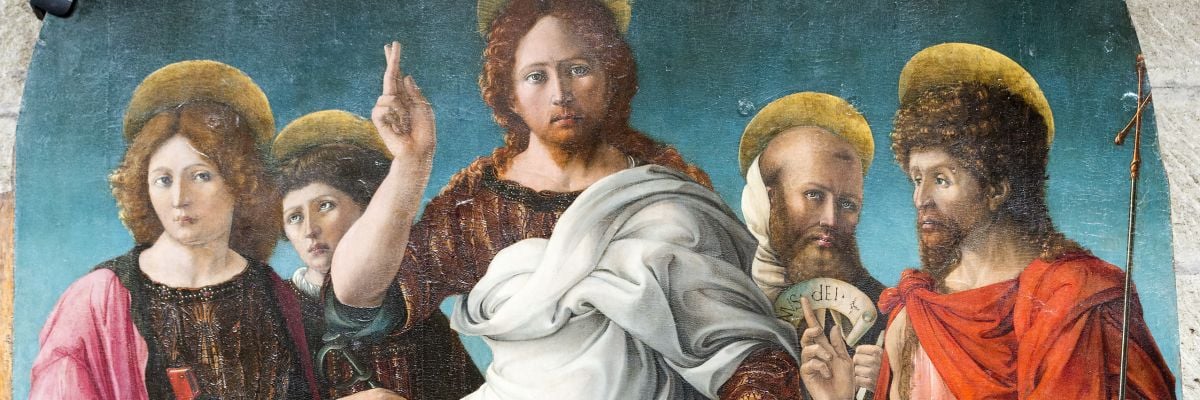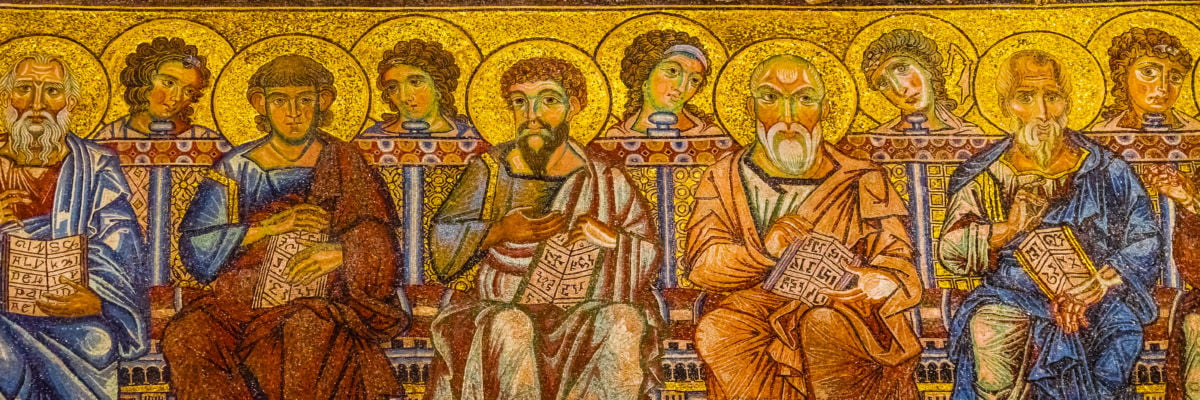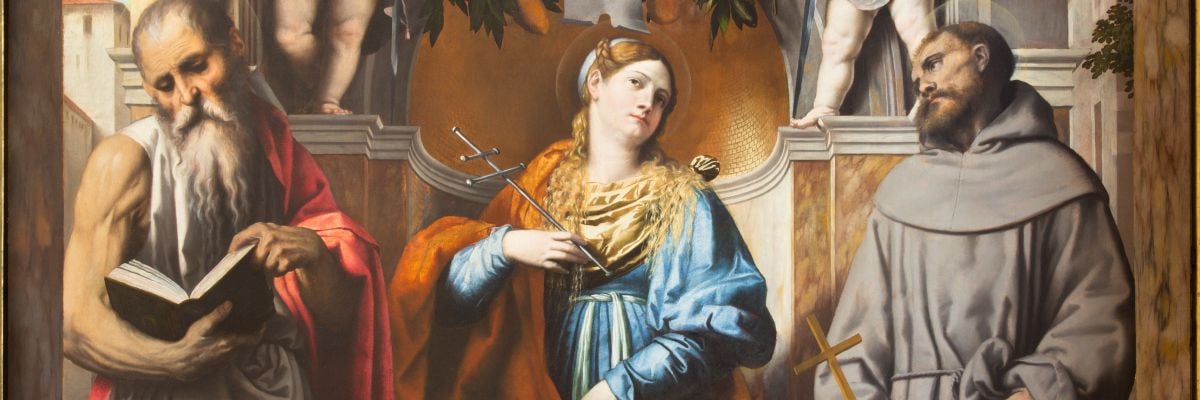What the Early Church Believed: The Intercession of the Saints
Fundamentalists often challenge the Catholic practice praying to saints. But the Bible directs us to invoke those in heaven and ask them to pray with us.

www.catholic.com
Fundamentalists often challenge the Catholic practice of asking saints and angels to pray on our behalf. But the Bible directs us to invoke those in heaven and ask them to pray with us.
Thus, in Psalm 103 we pray, “Bless the Lord, O you his angels, you mighty ones who do his word, hearkening to the voice of his word! Bless the Lord, all his hosts, his ministers that do his will!” (Ps. 103:20–21). And in the opening verses of Psalms 148 we pray, “Praise the Lord! Praise the Lord from the heavens, praise him in the heights! Praise him, all his angels, praise him, all his host!”
Not only do those in heaven pray
with us, they also pray
for us. In the book of Revelation, John sees that “the twenty-four elders [the leaders of the people of God in heaven] fell down before the Lamb, each holding a harp, and with golden bowls full of incense, which are the prayers of the saints” (Rev. 5:8). Thus the saints in heaven offer to God the prayers of the saints on earth.
Angels do the same thing: “[An] angel came and stood at the altar [in heaven] with a golden censer; and he was given much incense to mingle with the prayers of all the saints upon the golden altar before the throne; and the smoke of the incense rose with the prayers of the saints from the hand of the angel before God” (Rev. 8:3–4).
Jesus himself warned us not to offend small children, because their guardian angels have guaranteed intercessory access to the Father: “See that you do not despise one of these little ones; for I tell you that in heaven their angels always see the face of my Father who is in heaven” (Matt. 18:10).
Because he is the only God-man and the mediator of the New Covenant, Jesus is the only mediator between man and God (1 Tim. 2:5), but this in no way means we cannot or should not ask our fellow Christians to pray with us and for us (1 Tim. 2:1–4). In particular, we should ask the intercession of those Christians in heaven, who have already had their sanctification completed, because “[t]he prayer of a righteous man has great power in its effects” (Jas. 5:16).
As the following passages show, the early
Church Fathers not only clearly recognized the biblical teaching that those in heaven can and do intercede for us, but they also applied this teaching in their own daily prayer life.
Hermas
“[The Shepherd said:] ‘But those who are weak and slothful in prayer, hesitate to ask anything from the Lord; but the Lord is full of compassion, and gives without fail to all who ask him. But you, [Hermas,] having been strengthened by the holy angel [you saw], and having obtained from him such intercession, and not being slothful, why do not you ask of the Lord understanding, and receive it from him?’” (
The Shepherd 3:5:4 [A.D. 80]).
Clement of Alexandria
“In this way is he [the true Christian] always pure for prayer. He also prays in the society of angels, as being already of angelic rank, and he is never out of their holy keeping; and though he pray alone, he has the choir of the saints standing with him [in prayer]” (
Miscellanies 7:12 [A.D. 208]).
Origen
“But not the high priest [Christ] alone prays for those who pray sincerely, but also the angels . . . as also the souls of the saints who have already fallen asleep” (
Prayer 11 [A.D. 233]).
Cyprian of Carthage
“Let us remember one another in concord and unanimity. Let us on both sides [of death] always pray for one another. Let us relieve burdens and afflictions by mutual love, that if one of us, by the swiftness of divine condescension, shall go hence first, our love may continue in the presence of the Lord, and our prayers for our brethren and sisters not cease in the presence of the Father’s mercy” (
Letters 56[60]:5 [A.D. 253]).
Anonymous
“Atticus, sleep in peace, secure in your safety, and pray anxiously for our sins” (funerary inscription near St. Sabina’s in Rome [A.D. 300]).
“Pray for your parents, Matronata Matrona. She lived one year, fifty-two days” (ibid.).
“Mother of God, [listen to] my petitions; do not disregard us in adversity, but rescue us from danger” (
Rylands Papyrus 3 [A.D. 350]).
Methodius
“Hail to you for ever, Virgin Mother of God, our unceasing joy, for to you do I turn again. . . . Hail, you treasure of the love of God. Hail, you fount of the Son’s love for man” (
Oration on Simeon and Anna 14 [A.D. 305]).
“Therefore, we pray [ask] you, the most excellent among women, who glories in the confidence of your maternal honors, that you would unceasingly keep us in remembrance. O holy Mother of God, remember us, I say, who make our boast in you, and who in august hymns celebrate the memory, which will ever live, and never fade away” (ibid.).
“And you also, O honored and venerable Simeon, you earliest host of our holy religion, and teacher of the resurrection of the faithful, do be our patron and advocate with that Savior God, whom you were deemed worthy to receive into your arms. We, together with you, sing our praises to Christ, who has the power of life and death, saying, ‘You are the true Light, proceeding from the true Light; the true God, begotten of the true God’” (ibid.).
Cyril of Jerusalem
“Then [during the Eucharistic prayer] we make mention also of those who have already fallen asleep: first, the patriarchs, prophets, apostles, and martyrs, that through their prayers and supplications God would receive our petition” (
Catechetical Lectures 23:9 [A.D. 350]).
Hilary of Poitiers
“To those who wish to stand [in God’s grace], neither the guardianship of saints nor the defenses of angels are wanting” (
Commentary on the Psalms 124:5:6 [A.D. 365]).
Ephraim the Syrian
“You victorious martyrs who endured torments gladly for the sake of the God and Savior, you who have boldness of speech toward the Lord himself, you saints, intercede for us who are timid and sinful men, full of sloth, that the grace of Christ may come upon us, and enlighten the hearts of all of us so that we may love him” (
Commentary on Mark [A.D. 370]).
“Remember me, you heirs of God, you brethren of Christ; supplicate the Savior earnestly for me, that I may be freed through Christ from him that fights against me day by day” (
The Fear at the End of Life [A.D. 370]).
The Liturgy of St. Basil
“By the command of your only-begotten Son we communicate with the memory of your saints . . . by whose prayers and supplications have mercy upon us all, and deliver us for the sake of your holy name” (
Liturgy of St. Basil [A.D. 373]).
Pectorius
“Aschandius, my father, dearly beloved of my heart, with my sweet mother and my brethren, remember your Pectorius in the peace of the Fish [Christ]” (
Epitaph of Pectorius [A.D. 375]).
Gregory of Nazianz
“May you [Cyprian] look down from above propitiously upon us, and guide our word and life; and shepherd this sacred flock . . . gladden the Holy Trinity, before which you stand” (
Orations 17[24] [A.D. 380]).
“Yes, I am well assured that [my father’s] intercession is of more avail now than was his instruction in former days, since he is closer to God, now that he has shaken off his bodily fetters, and freed his mind from the clay that obscured it, and holds conversation naked with the nakedness of the prime and purest mind” (ibid., 18:4).
Gregory of Nyssa
“[Ephraim], you who are standing at the divine altar [in heaven] . . . bear us all in remembrance, petitioning for us the remission of sins, and the fruition of an everlasting kingdom” (
Sermon on Ephraim the Syrian [A.D. 380]).
John Chrysostom
“He that wears the purple [i.e., a royal man] . . . stands begging of the saints to be his patrons with God, and he that wears a diadem begs the tentmaker [Paul] and the fisherman [Peter] as patrons, even though they be dead” (
Homilies on Second Corinthians 26 [A.D. 392]).
“When you perceive that God is chastening you, fly not to his enemies . . . but to his friends, the martyrs, the saints, and those who were pleasing to him, and who have great power [in God]” (
Orations 8:6 [A.D. 396]).
Ambrose of Milan
“May Peter, who wept so efficaciously for himself, weep for us and turn towards us Christ’s benign countenance” (
The Six Days Work 5:25:90 [A.D. 393]).
Jerome
“You say in your book that while we live we are able to pray for each other, but afterwards when we have died, the prayer of no person for another can be heard. . . . But if the apostles and martyrs while still in the body can pray for others, at a time when they ought still be solicitous about themselves, how much more will they do so after their crowns, victories, and triumphs?” (
Against Vigilantius 6 [A.D. 406]).
Augustine
“A Christian people celebrates together in religious solemnity the memorials of the martyrs, both to encourage their being imitated and so that it can share in their merits and be aided by their prayers” (
Against Faustus the Manichean [A.D. 400]).
“At the Lord’s table we do not commemorate martyrs in the same way that we do others who rest in peace so as to pray for them, but rather that they may pray for us that we may follow in their footsteps” (
Homilies on John 84 [A.D. 416]).
“Neither are the souls of the pious dead separated from the Church which even now is the kingdom of Christ. Otherwise there would be no remembrance of them at the altar of God in the communication of the Body of Christ” (
The City of God 20

2 [A.D. 419]).

www.catholic.com
2 [A.D. 419]).

